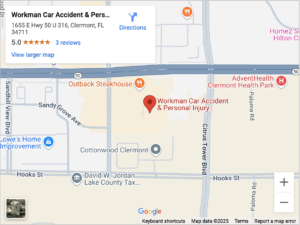
You may be entitled to compensation for various damages if another party caused your accident or injury. Economic and non-economic damages compensate you for your financial losses, physical injuries, pain, and suffering. A small number of personal injury lawsuits may result in punitive damages.
An award for punitive damages in Fort Lauderdale can significantly increase your compensation for a personal injury lawsuit. Read on to learn more.
Punitive Damages Defined

Punitive damages are awarded as a monetary judgment paid to a plaintiff (i.e., injured party) in a personal injury lawsuit. However, punitive damages are awarded in a small number of personal injury lawsuits. A study by the U.S. Department of Justice found punitive damages awarded in only 5% of civil cases won by plaintiffs.
The Purpose of Punitive Damages
Punitive damages are awarded to punish the at-fault party for especially reckless, malicious, or egregious conduct. Unlike other types of damages, their primary goal is not to compensate the victim but to penalize the wrongdoer and discourage similar behavior in the future, both by the defendant and others.
While the injured party does receive the award, the emphasis is on deterrence and accountability.
Punitive vs. Compensatory Damages in Florida
Compensatory damages are meant to make an injured party “whole” again by covering actual losses, such as medical expenses, lost income, and pain and suffering. Punitive damages, on the other hand, are not tied to the victim’s specific losses. Instead, they serve as a financial punishment for the defendant’s extreme misconduct and a warning to others.
Although the victim receives the award, punitive damages are not designed as direct compensation.
Legal Basis for Punitive Damages
Florida’s punitive damages laws govern awards in Fort Lauderdale courts. Florida Statute 768.72 states that punitive damages may be awarded if the plaintiff proves by clear and convincing evidence that the defendant acted with gross negligence or intentional misconduct.
Gross Negligence
Gross negligence lawsuits in Florida allege that the defendant’s conduct rose to the level of a “conscious disregard or indifference” for the rights, safety, or life of another person. In other words, the defendant’s conduct was much worse than ordinary negligence.
Intentional Misconduct
Intentional misconduct compensation in Florida may be awarded if the defendant:
- Had actual knowledge that their conduct was wrong;
- The conduct had a high probability of causing damage or injury to the claimant; and,
- Intentionally continued with the course of conduct despite knowing the danger.
Proving intentional misconduct under Florida law requires strong evidence that the defendant knew their actions were wrong, understood the high risk of harm, and chose to proceed anyway.
The Burden of Proof for Punitive Damages
Punitive damages have a higher burden of proof than compensatory damages. Florida law requires the plaintiff to prove punitive damages by clear and convincing evidence. “Clear and convincing” is a medium level of proof.
It requires proving that your allegations are substantially and highly more likely to be true than untrue.
When Are Punitive Damages Awarded in Florida?
As discussed above, punitive damages are typically awarded only in cases involving gross negligence or intentional misconduct. Examples of personal injury cases that might result in a punitive damages award include, but are not limited to:
- DUI accident cases
- Assaults and intentional violence
- Cases involving elder abuse or child abuse
- Hit-and-run accidents
- A company knew a product was defective, hid the defect, and sold the product
- A doctor injures a patient because they performed surgery while drunk or impaired by drugs
Personal injury claims seeking punitive damages are decided on a case-by-case basis. The jurors must determine if the facts of the case support an award for punitive damages.
Limitations on Punitive Damages in Florida: How Punitive Damages Are Calculated
Florida Statute 768.73 provides the formula for calculating punitive damages in a South Florida personal injury lawsuit. Generally, punitive damages equal the greater of:
- The amount of $500,000; OR,
- Three times the amount of compensatory damages was awarded to the plaintiff.
A personal injury lawyer with experience in punitive damages can review your case and advise whether punitive damages may be appropriate.
Exceptions to Punitive Damages Caps
Sometimes, Florida law allows more money to be awarded for punitive damages. If a jury decides that the defendant was only trying to make an unfair profit, the cap can be raised. In that case, the award can be up to $2 million or four times the amount of regular damages, whichever is more.
The jury must also believe that someone in charge, like a manager or officer, knew the behavior was dangerous and likely to hurt someone. If the jury finds that the defendant meant to cause harm and did, there is no cap at all. Juries aren’t told about these limits, but if they award too much money, the judge can lower it. Judges can also reduce the amount if they think it’s unfair.
Why Legal Representation Matters in Punitive Damage Claims
Pursuing punitive damages isn’t like filing a typical personal injury claim. These cases are complex and require meeting higher legal standards. That’s why having a skilled civil trial attorney is so important.
An experienced lawyer:
- Understands the strict legal requirements for pursuing punitive damages
- Knows how to navigate the higher burden of proof involved in these claims
- Has experience identifying when a case qualifies for gross negligence or intentional misconduct
- Gathers the detailed evidence needed to support your case
- Builds a strong, well-supported claim to maximize your potential recovery
- Helps avoid mistakes that could result in a denial of punitive damages
Without knowledgeable legal guidance, you could miss your chance to recover punitive damages entirely.
Get Help With a Florida Punitive Damages Claim
Punitive damages are not awarded in every personal injury case, but when they are, they can significantly increase the total value of your recovery. These damages are reserved for situations where the defendant’s behavior was especially reckless or intentionally harmful.
Because of the strict legal requirements and higher burden of proof, securing punitive damages is a complex process. For help, contact Workman Car Accident & Personal Injury Lawyers to schedule a free consultation with a Florida personal injury lawyer. Call us at (954) 361-3997.


